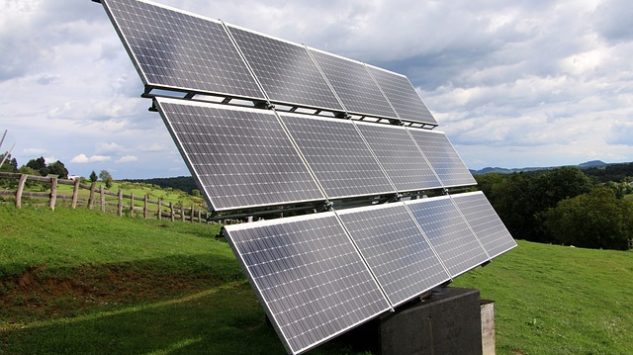Issue Briefs

The Limits of Green Energy Technologies
Paolo von Schirach
December 27th, 2021
WASHINGTON — Here is our problem. We really want to stop global warming. But we lack the adequate green energy technology tools to do the job. We know that the traditional fossil fuels energy sources –coal, oil products and natural gas– produce unwanted side effects. Burning these fuels generates massive amounts of greenhouse gases that are trapped in the atmosphere. This is what causes global warming.
If this is the problem, we believed we had the right solution. Green energy would power the global economy, just like fossil fuels do; but without producing any emissions. Therefore, we reached the consensus that green energy, mostly wind and solar, must be deployed on a massive scale across the globe –as soon as possible. As we scale up wind and solar, we shall rapidly retire the old, dirty fossil fuels-fired power plants. This is how we shall stop global warming and eventually climate catastrophe.
Not doable
It sounds like a good plan. Except that it is not doable. Yes, not doable, because the green tech tools we currently have are woefully inadequate. Indeed, the huge problem facing us is that solar and wind, while they have become much better and cheaper over the years, in most cases are still not cost-effective. Therefore they are not rapidly scalable. In order to obtain a real inflection, we would need a quick phasing out of fossil fuels, while deploying solar and wind –on a truly massive scale.
Government mandates
Let’s clarify this. Green energy adoption is indeed growing, but not as much as we would need it to grow in order to substantially cut emissions, this way causing a real inflection point in the progressive rise of global temperatures. And why is that? Because this adoption is not market-driven. Green tech solutions are still too expensive and not very efficient. Solar and wind are intermittent forms of energy. You need back up plants to supply energy when the wind does not blow and the sun does not shine.
Because of the fear of global warming and its devastating effects, green tech adoption is forced by governments concerned about rising temperatures on reluctant utilities and energy users in the developed world. In under resourced emerging countries the cost of green tech is so high that governments, even if they wanted to, simply have no way of imposing very expensive wind and solar energy on poor people.
Forced adoption
So, here is the picture. Without set asides, mandates, tax incentives, rebates and more, wind and solar would not be looked at as a truly viable alternative to fossil fuels, at least in most cases. They are deployed now because of mandates imposed by governments because they see them as the only tools they have to cut down harmful emissions, slow down global warming, and avoid climate catastrophe.
Which is to say that green technologies have been and will be adopted not because they are superior alternatives, objectively delivering better value for money than fossil fuels –this is usually the rationale for adopting all commercially viable innovations. This energy transformation has very little to do with basic economics. Because of climate change concerns, policy-makers are forcing on utilities expensive, ineffective and not reliable forms of energy.
Not enough
Still, precisely because these are uneconomic reasons for uneconomic energy solutions, the hard truth is that even with all these mandates, tax breaks and other direct and indirect incentives, it is just not possible to foresee the massive adoption, on a global scale, of costly, and still ineffective green energy technologies.
This is especially true in cost conscious and under resourced emerging markets (think most of Africa and large parts of India and Latin America) that simply cannot afford the high cost of transitioning from dirty coal to clean solar and wind. Therefore, given these powerful constraints, the limited amount of renewable, green energy solutions that can be realistically deployed at a very high cost across the world (mostly in rich countries) in the short and medium term will not stop, let alone reverse global temperatures increases in any significant way.
So, here is the not so inspiring picture. With renewable energy technologies, at their current state of development, we have a high cost, low effectiveness “solution” that does not even begin to seriously address the rising temperatures problem. This does not mean that in the future we humans shall not be able to invent cost-effective, emissions free, renewable technologies.
This simply means that we do not have them today.
A different approach
That said, there are other ways to address global warming, certainly a real issue, in a more constructive way. First of all, we –the rich, developed countries first and foremost– should direct much more funding to robust R&D efforts into existing or new green energy technologies, with the hope of obtaining down the line vast cost-effectiveness improvements in wind and solar, or maybe in something entirely different, such as small nuclear reactors that could be much cheaper than the large ones we are used to and ultra safe.
At the same time, we should invest heavily, beginning now, in global warming mitigation and adaptation technologies. Rising global temperatures and their impact on our planet represent serious challenges. Still, there are possible, and in many instances proven countermeasures. They range from improved man-made coastal defenses in order to protect human settlements from rising sea levels to modified seeds that can create drought resisting crops, and a lot more.
So, here is the thing. Renewable energy technologies are here to stay. They have been significantly improved over the years. But much more needs to be done before they will be widely and voluntarilyadopted on the basis of their proven ability to deliver higher economic value compared with traditional, dirty fossil fuels based technologies. Heavy investments in green sectors R&D will probably yield results in the future. In the meantime, let’s deal with the global warming challenge via adaptation and mitigation. A frontal assault on carbon energy, without having in hand a meaningful replacement, is unproductive and unwise.
The views and opinions expressed in this issue brief are those of the author.
 |
Paolo von Schirach is the President of the Global Policy Institute, a Washington DC think tank, and Chair of Political Science and International Relations at Bay Atlantic University, also in Washington, DC. He is also the Editor of the Schirach Report. |